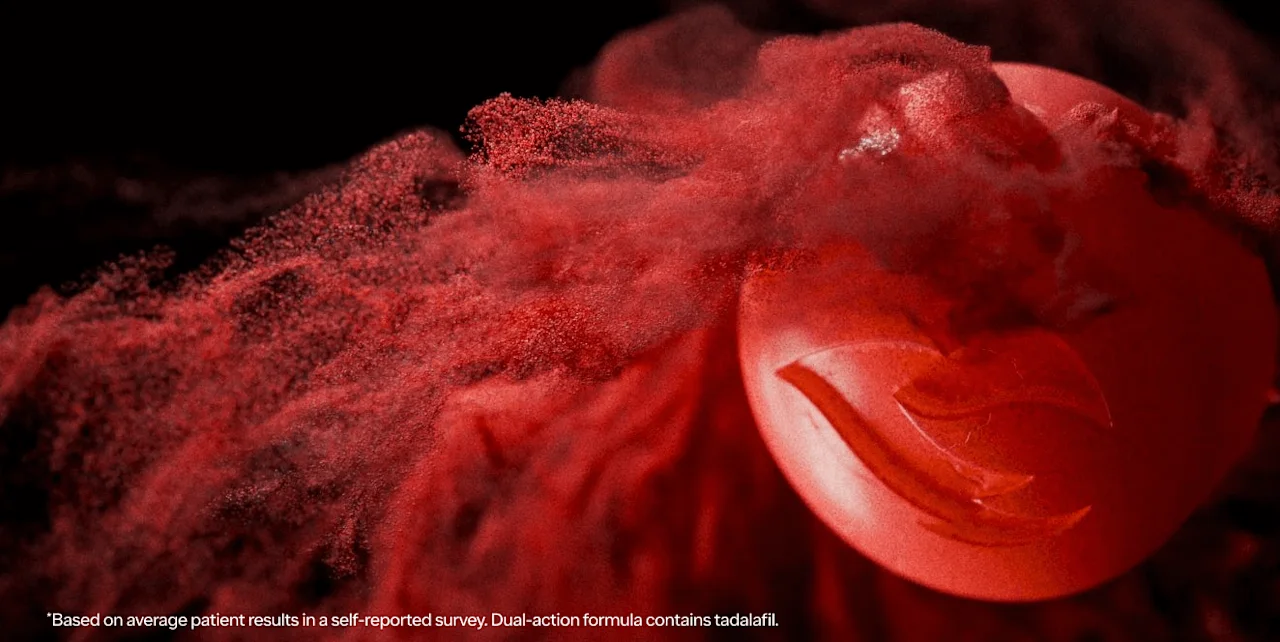Key takeaways
There is no evidence that baking soda can treat erectile dysfunction (ED).
Some claim that drinking water mixed with baking soda can improve erections by balancing pH levels and boosting nitric oxide, a blood flow-promoting molecule.
There is little to no research backing up this supposed ED solution, and ingesting too much baking soda can pose risks to your health.
If you’re having trouble getting or keeping an erection, consult a healthcare provider to determine the root of the problem and explore proven treatments, such as prescription medications (e.g. Viagra, Cialis).
Here's what we'll cover
Here's what we'll cover
Here's what we'll cover
Key takeaways
There is no evidence that baking soda can treat erectile dysfunction (ED).
Some claim that drinking water mixed with baking soda can improve erections by balancing pH levels and boosting nitric oxide, a blood flow-promoting molecule.
There is little to no research backing up this supposed ED solution, and ingesting too much baking soda can pose risks to your health.
If you’re having trouble getting or keeping an erection, consult a healthcare provider to determine the root of the problem and explore proven treatments, such as prescription medications (e.g. Viagra, Cialis).
Baking soda is a common household item touted as a remedy for seemingly everything from stinky feet to — yup — erectile dysfunction (ED). In fact, rumors about ingesting baking soda for ED have been making the internet rounds lately. But does baking soda actually work for ED?
Unfortunately, no. Baking soda is unlikely to make any difference in your erections, unlike science-backed ED treatments like Viagra (sildenafil) or Cialis (tadalafil).
Here’s what you need to know about the thinking behind baking soda for ED — and how consuming too much of the ingredient can offer more risk than reward.
What is the baking soda trick for men?
The baking soda trick for men involves drinking a mixture of water and baking soda. Typically, the “recipe” calls for mixing 1/2-1 tsp of baking soda into a glass of water (about 8 ounces).
So, what’s with the claim? The magic of baking soda, also known as sodium bicarbonate, is that it’s naturally alkaline — aka, it’s a base, not an acid. Bases neutralize acids, which is why baking soda can eliminate some odors and occasionally calm sour stomachs.
The theory behind the baking soda trick for men (aka using it for ED) takes the substance’s alkalinity and arguably stretches it too far. The rumor goes that consuming a tonic of baking soda mixed into water can rebalance the body’s pH and stimulate the production of nitric oxide, a molecule that plays a vital role in healthy, long-lasting erections.
Does using baking soda for ED work?
First things first: Baking soda is not an effective home remedy for ED. If a quick DIY trick for ED sounds too good to be true, it very likely is too good to be true.
The process of getting an erection is complex and involves the vascular, neurologic, and hormonal systems. Not to mention, erectile dysfunction has many potential underlying causes, including obesity, diabetes, cardiovascular disease, medication side effects, and depression.
There isn’t any scientific proof to back up the baking soda trick for men. Simply drinking a mixture of water and baking soda will not address any of the underlying, common causes of ED. It also will not have a significant impact on the vascular, neurologic, or hormonal systems that go into the formation of an erection.
Not to mention, consuming baking soda likely has more risks than benefits.
4 potential risks of using baking soda for ED
Baking soda is not inherently dangerous. But it’s typically only considered safe for consumption in limited quantities — like using a teaspoon or two for a batch of cookies. Chugging entire glasses of baking soda water can be unsafe, especially as a long-term practice.
Here are the risks of using baking soda for ED.
1. Too much sodium
No matter how much water you dilute it with, a single teaspoon of baking soda for ED still contains 1,260 mg of sodium. That’s more than half the 2,000 mg recommended daily limit from the World Health Organization (WHO).
Research shows a clear link between high sodium diets and high blood pressure and an increased risk of heart disease. When blood pressure is too high for too long, it’s classified as hypertension — a diagnosis associated with unnecessary strain on the heart, damage to blood vessels, and an increased risk of erectile dysfunction.
2. Electrolyte imbalance
Baking soda contains two electrolytes: bicarbonate and sodium. Electrolytes are essential substances that play an important role in hydration and fluid balance. Too much or too little of one electrolyte can throw off the mix.
This means that ingesting large quantities of bicarbonate and sodium as a supposed ED remedy could cause an electrolyte imbalance. Symptoms vary depending on the severity of the imbalance. For instance, an excess of sodium can cause excess thirst and lightheadedness. Excess bicarbonate causes alkalosis, which is explained below.
3. Metabolic alkalosis
Disrupting the body’s natural pH with too much of an alkaline substance like baking soda for ED can lead to a dangerous state called metabolic alkalosis. In this state, the body’s delicate balance of acid and base has been compromised.
Symptoms of alkalosis may include nausea or vomiting, weakness, and even confusion.
4. Gastrointestinal distress
On top of not providing any down-there perks, baking soda could mess with your sexual performance by making you feel sick to your stomach.
In one small study involving oral ingestion of (i.e. drinking) sodium bicarbonate, 91% of participants experienced diarrhea. More than half also reported bloating, and nearly half experienced nausea.
Gut issues should be temporary, but they’re still not a fun result of drinking watered-down baking soda for ED.
Alternatives to baking soda for ED
If you’ve been struggling to get or maintain erections, you have better options than baking soda. Here are some evidence-based treatments for ED that have cold, hard science to back them up.
Every body is different, so it’s important to get personalized medical advice from a healthcare provider (face-to-face or online, such as through Ro) to determine which, if any, of these drugs is the best ED treatment for you.
Prescription medications
The first-line treatment for erectile dysfunction is a type of oral medication belonging to a drug class called PDE5 inhibitors. These prescription drugs work in part by relaxing the blood vessels in the penis, which improves blood flow for a harder, longer-lasting erection.
Examples of PDE5 inhibitors approved by the US Food and Drug Administration (FDA) include:
Viagra (sildenafil)
Cialis (tadalafil)
Stendra (avanafil)
Vardenafil (the generic of a now-discontinued brand-name drug called Levitra)
Certain PDE5 inhibitors can also be found in other formulations—a perk if you’re not a fan of popping pills. For example:
Ro Sparks: a fast-acting sublingual (read: under-the-tongue) tablet that combines sildenafil and tadalafil, the active ingredients in Viagra and Cialis
Daily Rise Gummies: a once-a-day, fruit-flavored gummy that contains tadalafil
Though these formulations are not FDA-approved, they contain ingredients that have been individually FDA-approved for ED.
Lifestyle changes
There is no simple trick to cure ED. But you may be able to improve mild ED symptoms without medication. Lifestyle changes can also be a vital supplement to FDA-approved prescription drugs for ED. Key lifestyle factors include:
Quitting smoking. Research suggests that people who currently smoke have a 50% higher risk of ED compared to people who have never smoked. Dropping this habit has the potential to dramatically improve ED and overall sexual satisfaction.
Improving your diet. Cardiovascular disease is a strong risk factor for ED, so maintaining a heart-healthy diet may help prevent worsening ED and support healthy blood flow to the penis. Reduce your consumption of processed foods, sugary snacks, and booze, all of which can worsen sexual performance issues.
Moving your body regularly. Research shows that regular exercise can reduce the risk of ED. Cycling, swimming, brisk walking, and jogging are all great ways to get your blood pumping.
Addressing your mental health. ED can be stressful, and unfortunately, stress can also contribute to ED symptoms. That means pausing to improve your mindset with deep breathing or addressing chronic stress, anxiety, and depression with therapy may improve your mood and sexual performance.
Other therapies
Though they’re not the first-line treatment for ED, your healthcare provider may recommend other therapies, depending on the severity of your condition and other individual factors. Examples include:
Unlike oral medications, penile injections can cause erections without any other sexual stimulation. Injecting ED medication directly into the penis dilates the blood vessels so that the penis fills with blood, triggering a spontaneous erection.
As for medical devices for ED: A penis pump is a non-surgical device that works by manually boosting blood flow to the penis. Penis implants (aka penile prostheses) are surgically inserted in erectile tissue and can be either bent upward or inflated (depending on the type) to create erections.
Bottom line
If you struggle with ED, it’s normal to wish for a quick and easy fix. Unfortunately, baking soda for ED is another internet-perpetuated myth without scientific evidence. The hard truth is that ingesting baking soda is more likely to overload your body with sodium or cause diarrhea than improve your sexual function.
The specific baking soda trick for men (drinking water with baking soda for ED) is unproven. When it comes down to it, it’s just another too-good-to-be-true tactic circulating the internet.
Baking soda is not an effective treatment for erectile dysfunction. There is no scientific evidence that ingesting this common pantry item can improve sexual performance.
Proponents of the baking soda trick for men seem to claim that baking soda can balance the body’s overall pH. But the actual process of getting an erection has little to do with pH, and ingesting baking soda is unlikely to change your ability to get an erection.
Consuming too much baking soda is unhealthy. Baking soda is very high in sodium, so ingesting large quantities may lead to high blood pressure, electrolyte imbalance, and gastrointestinal issues.
There are effective treatments for ED, including clinically proven medications, such as Viagra or Cialis. Lifestyle changes can also help improve sexual performance, such as improving your diet, exercising regularly, managing stress, and quitting smoking.
Frequently asked questions (FAQs)
What can I drink for a full erection?
There is no one beverage that you can drink for a full erection. However, staying hydrated and drinking enough water can help combat dehydration-induced erectile dysfunction.
Additionally, drinks that reduce inflammation and improve blood flow may help as part of a balanced diet and include beetroot, pomegranate, watermelon, and grape juices, as well as green tea and coffee. Just watch the sugar: Many juices are high in added sugar, which can worsen blood sugar control and overall cardiovascular health if you drink them often.
Is baking soda and apple cider vinegar good for erectile dysfunction?
No, drinking baking soda and apple cider vinegar will not help erectile dysfunction. Sure, apple cider vinegar has some potential overall health benefits, such as promoting modest weight loss and controlling blood sugar. But there isn’t any scientific evidence directly linking apple cider vinegar to improved erections.
What are the benefits of drinking baking soda for men?
The main potential benefit of drinking water with baking soda is temporary relief from upset stomach, heartburn, and indigestion. This is because baking soda is a base that can neutralize excess stomach acid. Any sexual benefits of baking soda are myths.
Careful not to overdo it, though, as baking soda is also associated with risks. If you are experiencing frequent episodes of upset stomach or heartburn, it’s best to seek advice from a healthcare provider.
DISCLAIMER
If you have any medical questions or concerns, please talk to your healthcare provider. The articles on Health Guide are underpinned by peer-reviewed research and information drawn from medical societies and governmental agencies. However, they are not a substitute for professional medical advice, diagnosis, or treatment.
Viagra Important Safety Information: Read more about serious warnings and safety info.
Cialis Important Safety Information: Read more about serious warnings and safety info.
References
Al-Abri, S. A. & Olson, K. R. (2013). Baking Soda Can Settle the Stomach But Upset the Heart: Case Files of the Medical Toxicology Fellowship at the University of California, San Francisco. Journal of Medical Toxicology, 9(3), 255–258. doi: 10.1007/s13181-013-0300-4. Retrieved from https://pmc.ncbi.nlm.nih.gov/articles/PMC3770998/
Allen, M. S. & Walter, E. E. (2018). Health-Related Lifestyle Factors and Sexual Dysfunction: A Meta-Analysis of Population-Based Research. The Journal of Sexual Medicine, 15(4), 458–475. doi: 10.1016/j.jsxm.2018.02.008. Retrieved from https://pubmed.ncbi.nlm.nih.gov/29523476/
Allen, M. S., Wood, A. M., & Sheffield, D. (2023). The Psychology of Erectile Dysfunction. Current Directions in Psychological Science, 32(6), 487-493. doi: 10.1177/09637214231192269. Retrieved from https://journals.sagepub.com/doi/full/10.1177/09637214231192269
Almeida de Oliveira, A. & Pedrosa Nunes, K. (2020). Hypertension and Erectile Dysfunction: Breaking Down the Challenges. American Journal of Hypertension, 34(2), 134-142. https://doi.org/10.1093/ajh/hpaa143. Retrieved from https://academic.oup.com/ajh/article/34/2/134/5899803
Cao, S., Yin, X., Wang, Y., et al. (2013). Smoking and risk of erectile dysfunction: systematic review of observational studies with meta-analysis. PloS One, 8(4), e60443. doi: 10.1371/journal.pone.0060443. Retrieved from https://pmc.ncbi.nlm.nih.gov/articles/PMC3616119/
Dhaliwal A. & Gupta M. (2023). PDE5 Inhibitors. StatPearls. Retrieved from https://www.ncbi.nlm.nih.gov/books/NBK549843/
Diaconu, A., Florea, I., Vlad, C. E., et al. (2022). Metabolic alkalosis‑an adverse effect of baking soda misuse: A case report and literature review. Experimental and Therapeutic Medicine, 24(5), 658. doi: 10.3892/etm.2022.11594. Retrieved from https://pmc.ncbi.nlm.nih.gov/articles/PMC9475337/
Kahle, L. E., Kelly, P. V., Eliot, K. A., et al. (2013). Acute sodium bicarbonate loading has negligible effects on resting and exercise blood pressure but causes gastrointestinal distress. Nutrition Research, 33(6), 479–486. doi: 10.1016/j.nutres.2013.04.009. Retrieved from https://pmc.ncbi.nlm.nih.gov/articles/PMC3680785/
Krzastek, S. C., Bopp, J., Smith, R. P., & Kovac, J. R. (2019). Recent advances in the understanding and management of erectile dysfunction. F1000Research, 8, F1000 Faculty Rev-102. [Version 1]. doi: 10.12688/f1000research.16576.1. Retrieved from https://www.ncbi.nlm.nih.gov/pmc/articles/PMC6348436/
Leslie, S. W. & Sooriyamoorthy, T. (2024). Erectile Dysfunction. StatPearls. Retrieved from https://www.ncbi.nlm.nih.gov/books/NBK562253/
MedlinePlus. (2024). Fluid and Electrolyte Imbalance. Retrieved from https://medlineplus.gov/fluidandelectrolytebalance.html
Panchatsharam, P. K., Durland J., & Zito P. M. (2023). Physiology, erection. StatPearls. Retrieved Jan. 26, 2026 from https://www.ncbi.nlm.nih.gov/books/NBK513278/
Rivera, A. (2024). NaHCO3 benefits for men. StrongHealth. Retrieved from https://www.stronghealth.com/baking-soda-for-ed
Senewiratne, N. L., Woodall, A., & Can, A. S. (2024) Sodium Bicarbonate. StatPearls. Retrieved from https://www.ncbi.nlm.nih.gov/books/NBK559139/
Sonani, B., Naganathan, S., & Al-Dhahir, M. A. (2023). Hypernatremia. StatPearls. Retrieved from https://www.ncbi.nlm.nih.gov/books/NBK441960/
Sur, M. & Hashmi, M. F. (2024). Alkalosis. StatPearls. Retrieved from https://www.ncbi.nlm.nih.gov/books/NBK545269/
U.S. Department of Agriculture (USDA). (2019). Leavening agents, baking soda. FoodData Central. Retrieved from https://fdc.nal.usda.gov/food-details/175040/nutrients
World Health Organization (WHO). (2025). Sodium reduction. Retrieved from https://www.who.int/news-room/fact-sheets/detail/sodium-reduction













